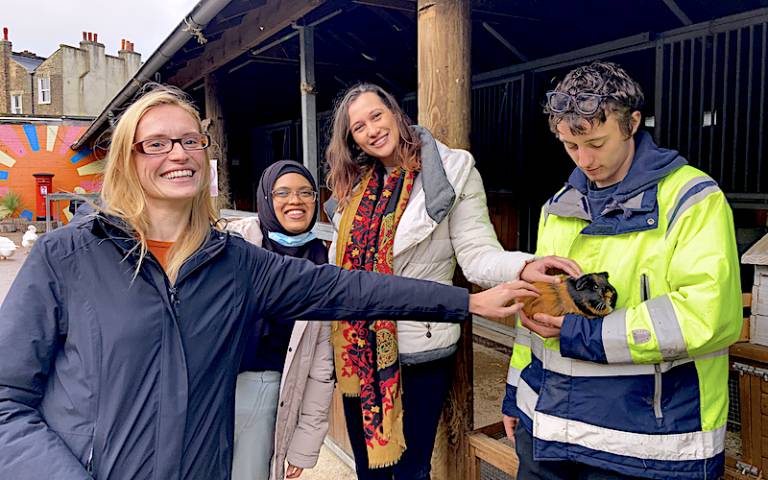Blog: New film features Evaluation Exchange and the impact of digital skills in change making
16 May 2023
UCL Institute for Environment Design and Engineering researchers and the UCL Evaluation Exchange are featured in a new film exploring the impact of digital skills in change making.

A blog by Gemma Moore and Ruth Unstead-Joss
The Evaluation Exchange is a collaboration between students, researchers and organisations aimed at building capacity in evaluation. Below we look at how digital skills feature in our programme and have helped organisations improve how they evaluate their work.
The Evaluation Exchange features in a new film exploring the impact of digital skills in change-making. Our involvement in the film got us thinking about how digital skills link with the success of our programme and the communities we work with. Here are our top 10 ways digital skills have featured in organisations’ collaboration with UCL through the Evaluation Exchange:
Presenting information through creative design
UCL students and researchers worked with Central YMCA to develop a theory of change explaining Central YMCA’s impact. UCL Chemistry PhD student Ben Thair used creative design skills to present the theory of change in a unique and engaging way. For Ben, the collaboration was an opportunity for creative expression that he might not have otherwise had in his research and studies. Krystyna Emery, Head of Fundraising at Central YMCA noted:
“The theory of change has been beneficial as it has really helped us to align our messaging. As a complex charity which has several different arms, it is sometimes hard to convey this effectively, and so having this visual which explains what we do to create change is very helpful.
Gathering data in an easy-to-use way
UCL students and researchers designed an interactive map for people visiting Kentish Town City Farm. The map aimed to engage a diversity of people visiting the farm including children, to feed back on their experience. The farm now has a fun way for visitors to share how they feel about their experience and what they have learnt. The data captured via the map is easy for staff and volunteers to interpret, and may be useful when applying for funding as well as helping the farm continually improve what they offer visitors.
On-line questionnaires and videos
A student and researcher team worked with Calthorpe Community Garden to determine how the varied elements of the garden make a difference to its visitors. The team developed and tested on-line questionnaires and also made a video of ‘why people love Calthorpe’.
Testing data collection tools
The students and researchers collaborating with disability organisation Deafroots trialled software that they hoped would capture audience responses through its game-based learning and voting system. The Evaluation Exchange funded the trial through a seed grant. The trial was helpful as it revealed that the system was difficult to use and perhaps not appropriate for a small charity.
Storing and processing data
Through another of our seed grants, we supported a community organisation’s transition to using Salesforce. The hope of the organisation, Lifeafterhummus Community Benefit Society, was that the transition from logging information on physical white boards to an on-line system would allow them to better store and access information and then analyse date more easily.
Collaborating on-line
The most recent Evaluation Exchange programme took place during the COVID-19 pandemic. We had no choice but to turn our programme that aimed to build relationships and networks through in-person interaction to an on-line format. We used digital tools such as Padlet, and Miro boards in our training session to encourage interaction. A director of a participating organisation contacted us asking for more information about our collaboration tools as they had found it helpful and wanted to use it elsewhere.
Film making
Organisations told us that they wanted to improve how they shared their story with different audiences. In response, we arranged for training with the ‘Smart phone film making course’ from Mile91 (an initiative that supports organisations to help tell their organisations’ stories). 6 people from community organisations in Camden and Newham expressed an interest in joining the course. One participant, Wictoria Babicz, Marketing Officer from Money A+E , noted:
“I did make a few videos before the course, however thanks to the smartphone film-making course I was able to structure my work more efficiently. I learned how to make more engaging videos and I was excited to implement my newly-gained knowledge.
Following the course, Wiktoria made a video about the Money A+E team’s experience of the Evaluation Exchange. We were delighted to showcase the video at our celebration event in April 2022 for other participants and staff from across UCL.
Sign-posting to digital skills training and support
Community organisations identified an on-going need to build skills in handling data. In response to this, we sign-posted individuals to Superhighways, an organisation that offers digital skills training to small charities.
Sharing the value of our work
Digital skills have helped us share our own story of collaboration with local communities. Our animation shows, in an enjoyable way, how and why UCL collaborates with community organisations through the Evaluation Exchange. Our film brings to life the voices of people involved highlighting the value of working together.
When digital skills are not always the answer
Organisations that we work with may need to design easy and accessible ways to gather feedback from and information about people using their services. Sometimes this means not using digital tools. We provide training on creative ways to gather information through activities with people who may be particularly vulnerable or for whom digital feedback is not the best way to gather information. The collaboration with Streetstorage is an example of creative ways that were developed to capture information in person, alongside the development of digital evaluation approaches.
 Close
Close

